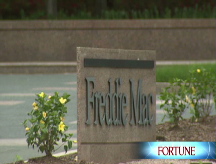Putting lipstick on a pig
Wall Street suffered from the illusion that it could make beautiful bonds out of piles of dubious mortgages.
(Fortune Magazine) -- If nothing else, we've learned recently that if you put lipstick on a pig, it's still a pig. Presumably that has always been true - unless of course the pig in question was a subprime mortgage derivative, circa 2006. Then it was quite possibly a "runaway bargain," a "great time to buy," or an "opportunity in a market that's only going to go up."
Still a pig, you say? Well, how is it that no one noticed the legions of bankers, ratings agencies, and real estate professionals bearing lipstick?
Treasury Secretary Hank Paulson has engineered a rescue of Fannie (FNM, Fortune 500) and Freddie (FRE, Fortune 500), but the markets are haunted by the specter of two more big institutions - Lehman Brothers (LEH, Fortune 500) and Washington Mutual (WM, Fortune 500) - on the brink.
The fate of Lehman may soon be decided though, with recent reports suggesting some sort of deal to rescue Lehman could be announced this weekend.
How did this all happen? One answer is that Wall Street, the ratings agencies, and regulators were blinded by the science of securitization - bundling ordinary debt like credit card balances, car loans, and mortgages into vast pools, then issuing bonds backed by those pools. It was a gigantic money machine for Wall Street, but it created a system that was unprecedented in its complexity and opacity.
You might have expected ratings agencies to see the problem, but instead they became part of it. Complex securities are often priced from models that assume, in what may be the apogee of wishful economic thinking, that the underlying assets will behave exactly as they have historically. That has always been a weakness of model-based valuation, but it's particularly problematic when the securities are new and untested.
As for the Wall Street bankers who should have known better, they were mesmerized by the beauty of their creations. They forgot that those sophisticated securities were built from millions of mortgages that required someone to make payments every month. And in the real world, not the mathematical one, a lot of those loans were made to people who never had any plausible chance of repaying them. When the complexity of a security (lipstick, anyone?) has the effect of decoupling its value from that of the underlying asset, it can be very difficult to know what that security is truly worth. When no one knows what anything is worth anymore, it's easy to inflate an asset bubble.
And when it's easy to inflate an asset bubble, someone inevitably will, because all the players have incentives to do so. The way people are paid on Wall Street encourages them to pursue immediate returns at the expense of longer-term stability. Prudent managers might store capital in boom times to deal with the inevitable downturn. But given the ethos of returns-no-matter-what, available capital is capital that will be put to work. In the words of former Citigroup CEO Chuck Prince, "When the music stops, in terms of liquidity, things will be complicated. But as long as the music is playing, you've got to get up and dance. We're still dancing." Well, nobody's dancing anymore. ![]()
-
 The retail giant tops the Fortune 500 for the second year in a row. Who else made the list? More
The retail giant tops the Fortune 500 for the second year in a row. Who else made the list? More -
 This group of companies is all about social networking to connect with their customers. More
This group of companies is all about social networking to connect with their customers. More -
 The fight over the cholesterol medication is keeping a generic version from hitting the market. More
The fight over the cholesterol medication is keeping a generic version from hitting the market. More -
 Bin Laden may be dead, but the terrorist group he led doesn't need his money. More
Bin Laden may be dead, but the terrorist group he led doesn't need his money. More -
 U.S. real estate might be a mess, but in other parts of the world, home prices are jumping. More
U.S. real estate might be a mess, but in other parts of the world, home prices are jumping. More -
 Libya's output is a fraction of global production, but it's crucial to the nation's economy. More
Libya's output is a fraction of global production, but it's crucial to the nation's economy. More -
 Once rates start to rise, things could get ugly fast for our neighbors to the north. More
Once rates start to rise, things could get ugly fast for our neighbors to the north. More








